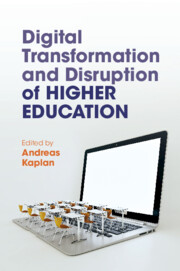Book contents
- Digital Transformation and Disruption of Higher Education
- Digital Transformation and Disruption of Higher Education
- Copyright page
- Contents
- Figures
- Tables
- Contributors
- Preface
- Chapter 1 Nothing Is Constant Except Change
- Part I (R)evolution of the Higher Education Sector
- Chapter 2 Higher Education’s Digitalisation
- Chapter 3 Online Learning
- Chapter 4 Social Exclusion and the Digital Divide
- Chapter 5 Internationalisation of Higher Education
- Chapter 6 Africa’s University Landscape
- Part II Changes in Teaching Formats
- Part III Changes in Teaching Content
- Part IV Networking and Social Activities
- Part V Certification and Diplomas
- Part VI Careers and Professionalisation
- Part VII Futuristic and Ultramodern Higher Education
- Part VIII Higher Education in Motion
- Editor’s Biography
- Index
- References
Chapter 2 - Higher Education’s Digitalisation
Past, Present and Future
from Part I - (R)evolution of the Higher Education Sector
Published online by Cambridge University Press: 09 June 2022
- Digital Transformation and Disruption of Higher Education
- Digital Transformation and Disruption of Higher Education
- Copyright page
- Contents
- Figures
- Tables
- Contributors
- Preface
- Chapter 1 Nothing Is Constant Except Change
- Part I (R)evolution of the Higher Education Sector
- Chapter 2 Higher Education’s Digitalisation
- Chapter 3 Online Learning
- Chapter 4 Social Exclusion and the Digital Divide
- Chapter 5 Internationalisation of Higher Education
- Chapter 6 Africa’s University Landscape
- Part II Changes in Teaching Formats
- Part III Changes in Teaching Content
- Part IV Networking and Social Activities
- Part V Certification and Diplomas
- Part VI Careers and Professionalisation
- Part VII Futuristic and Ultramodern Higher Education
- Part VIII Higher Education in Motion
- Editor’s Biography
- Index
- References
Summary
Following COVID-19 there has been discussion in the media of a digital revolution as across the world universities have been forced to teach at a distance. However, rather than being something entirely new, the move to technology enhanced learning (TEL) is a trend that has been observed for decades. In this chapter the authors present example projects from the Open University's OpenTEL research group that highlight some of the advances that have been made in terms of lifelong learning, open education, and science education supported by TEL. The chapter ends with discussion on what the digitalisation of higher education could mean post COVID-19. The role of universities is likely to change as society develops different needs and expectations of education. The newly acquired expertise of many higher educational institutes in TEL is likely to create opportunities for entrepreneurial universities, although due consideration must be given to the accessibility-related needs of an increasingly diverse student base.
Keywords
- Type
- Chapter
- Information
- Publisher: Cambridge University PressPrint publication year: 2022

